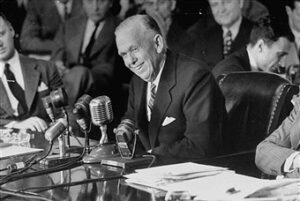 This article was originally posted January 12, 2018.
This article was originally posted January 12, 2018.
On January 8, 1948, Secretary of State George C. Marshall was the first of over 90 witnesses who would testify before the Senate Committee on Foreign Relations in what would ultimately develop into one of the most comprehensive public hearings undertaken on a foreign policy question up to that time.
In his opening statement, Marshall did not waste any time in getting down to the facts, a practice for which he had become well known when he was called to testify before Congress during his tenure as chief of staff of the United States Army during World War II. Marshall began:
This program will cost our country billions of dollars. It will impose a burden on the American taxpayer. It will require sacrifices today in order that we may enjoy security and peace tomorrow. Should the Congress approve the program for European recovery, as I urgently recommend, we Americans will have made a historic decision of our peacetime history.
Marshall continued by explaining how vital the economic recovery of Europe was to the overall world situation.
Without the establishment of economic health and vigor in the free countries of Europe, without the restoration of their social and political strength necessarily associated with economic recuperation, the prospect for the American people, and for free people everywhere, to find peace with justice and well-being and security for themselves and their children will be gravely prejudiced.
Marshall then provided a detailed description of the conditions in Europe that led to the current situation and explained that the United States must take responsibility for leading the efforts to aid Europe because “The United States is the only country in the world today which has the economic power and productivity to furnish the needed assistance.”
On the subject of the cost of the program Marshall emphasized that the $6.8 billion in funding requested for the first 15 months of the program was not an “asking figure” but absolutely essential and that the total of the program would be “somewhere between $15.1 to $17.8 billion.” Marshall acknowledged that the cost of the program “would involve some sacrifice on the part of the American people” but he went on to observe that:
The $6.8 billion proposed for the first 15 months is less than a single month’s charge of the war. A world of continuing uneasy half-peace will create demands for constantly mounting expenditures for defense. This program should be viewed as an investment in peace. In those terms, the cost is low.
Near the conclusion of his statement Marshall asserted “All we can say is this program does provide the means for success and if we maintain the will for success I believe that success will be achieved.”
After Marshall completed his statement the committee questioned him in great detail on virtually every aspect of the recovery program. Marshall’s testimony, which lasted a total of five hours, was the first of a number of appearances that he made before congressional committees to testify in support of the European Recovery Program.
